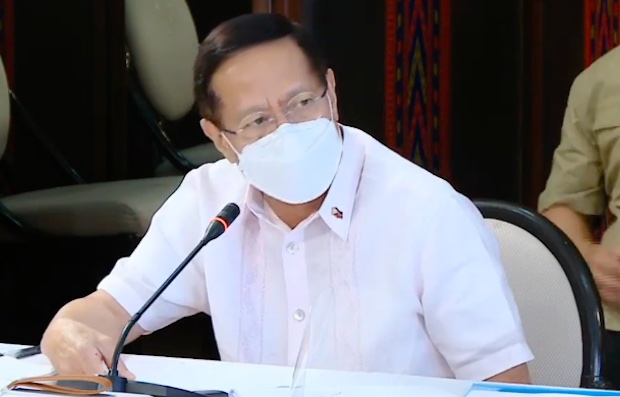Duque reminds Visayas, Mindanao execs to step up enforcement of COVID-19 protocols

Health Secretary Francisco Duque III gives his report on the COVID-19 situation during the taped briefing with President Rodrigo Duterte on Wednesday, May 26, 2021. (File photo from an RTVM video posted on Facebook)
MANILA, Philippines — Local government executives in the Visayas and Mindanao should continue to intensify the implementation of health protocols and improve their vaccination coverage to combat the rising number of COVID-19 in those regions.
Health Secretary Francisco Duque III issued this reminder on Monday during the taped weekly briefing with President Rodrigo Duterte.
He specifically insisted on implementing the PDITR strategy — that is, prevent, detect, isolate, treat, and reintegrate. This should be implemented along with the mandatory wearing of masks and face shields, physical distancing, frequent washing of hands, proper sanitation, and avoiding mass gatherings.
Duque noted that the number of COVID-19 cases nationwide had been leveling out, even decreasing — from 6,600 cases recorded two weeks ago to the 6,200 cases recorded a week before.
In particular, Metro Manila has shown a decrease in COVID-19 cases, he said as he showed charts to illustrate the situation.
Article continues after this advertisement“The movement of our cases [here] continued to plateau. We can see that black line is almost level,” he said in Filipino. “Looking at the cases per island group, [we can see that], the cases in the NCR [National Capital Region] continued to fall, although slowly. So here the decrease is slow, but there’s a decrease. That’s the important thing.”
Article continues after this advertisementOn the other hand, he noted that, in the Visayas and Mindanao, the trend was increasing.
Duque singled out Mindanao, as the area saw a continuous increase in COVID-19 cases, which is steeper than the increase in the Visayas.
This was not the first time that he pointed out the rising cases in Mindanao. Last June 14, Duque also noted that COVID-19 cases in the country were plateauing in general, but the attack rate was rising in parts of the Visayas and Mindanao.
As of Monday, the country’s confirmed COVID-19 cases was at 1.364 million COVID-19 cases — of which 55,847 are active infections.